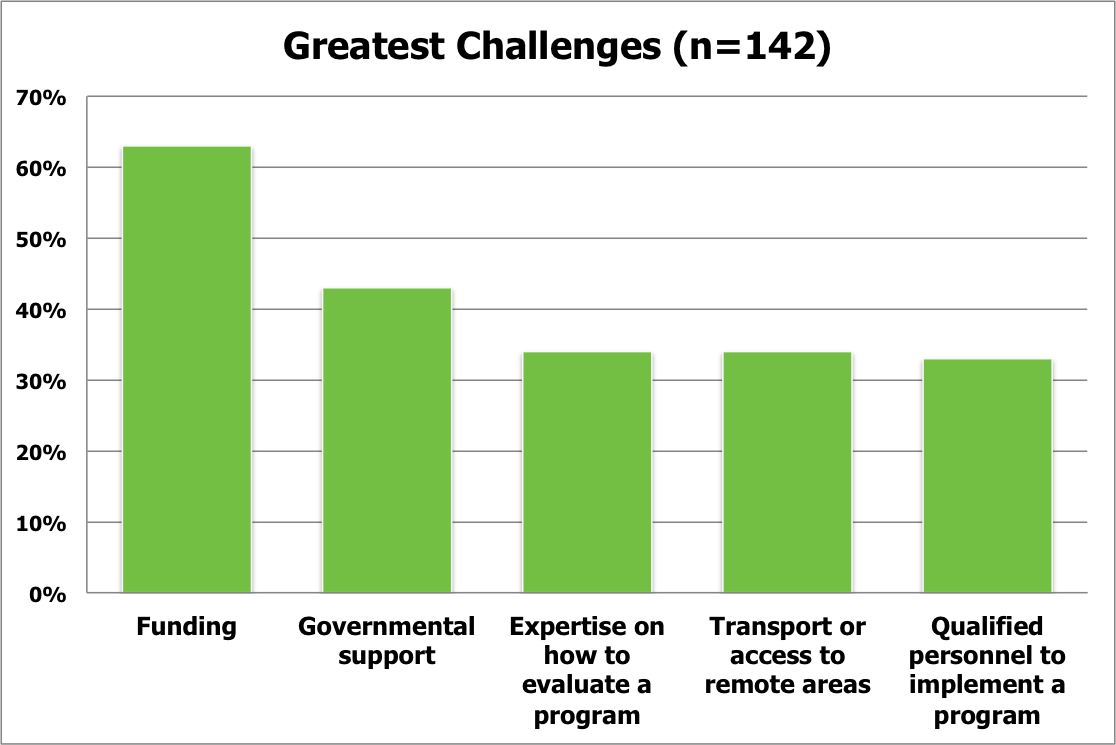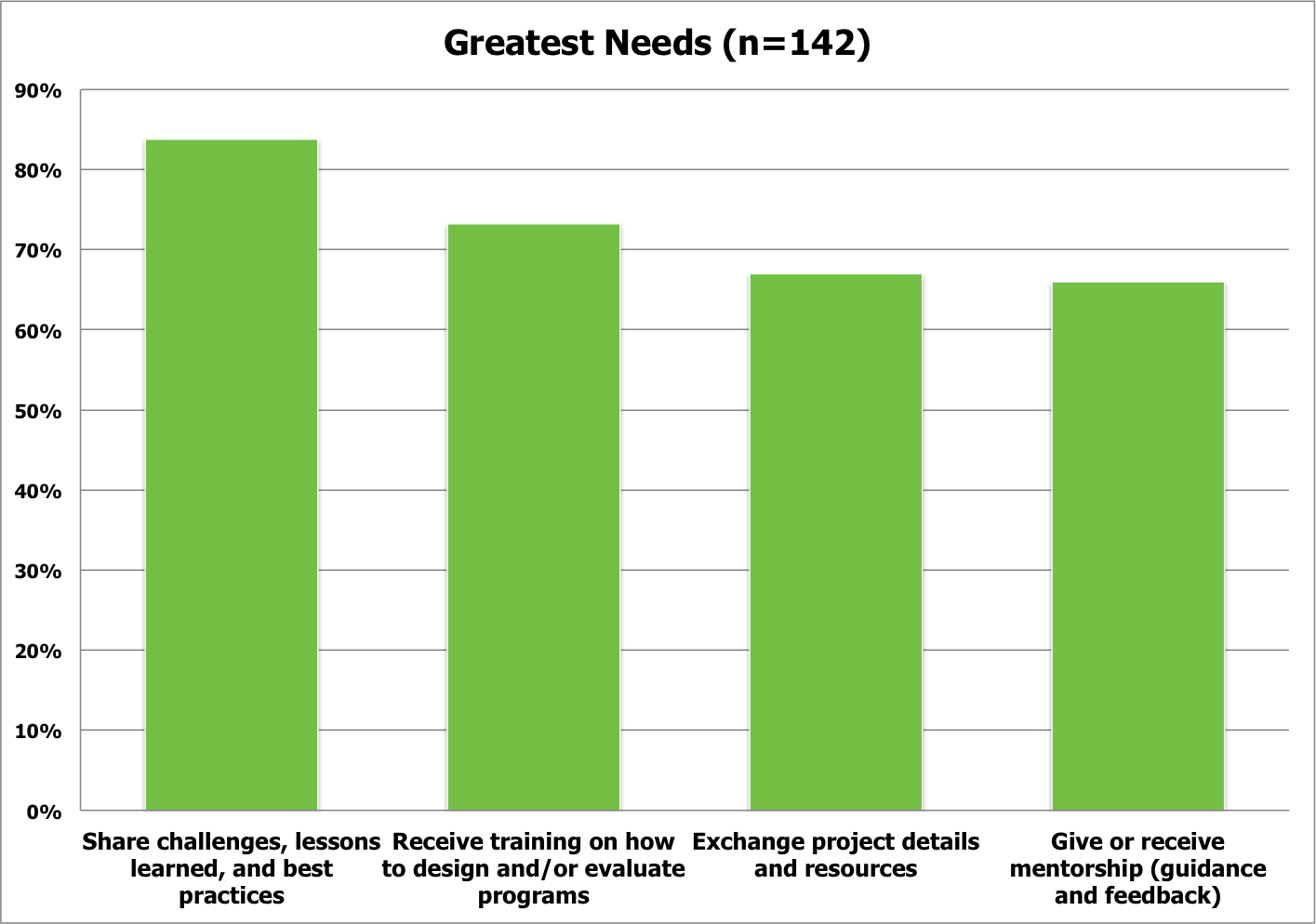In June, Primate Education Network (PEN) published our online 2014 Global Survey. Over the duration of two months (from mid-June to mid-August), we received 142 responses from conservation educators and other practitioners in the field of primatology. Our primary target audience was anyone involved in conservation education and working in primate range countries. The purpose of the survey was to gain insight into our colleagues’ challenges and needs, measure knowledge of and engagement with PEN, and confirm participation in our workshop and dinner reception at the International Primatological Society (IPS) Congress.
Our survey was administered as a Google Form and distributed through PEN’s social media outlets, e-newsletter, individual e-mails, and the IPS and Association of Zoos and Aquariums Education listservs.
142 Respondents. 50+ Countries.
87% Involved in Primate Education.
Over 50 countries were represented in the survey. Of the total 142 respondents, 92 percent are working in primate range countries (26 percent in Latin America, 39 percent in Africa, and 30 percent in Asia). Five respondents indicated they were working in more than one primate range region (e.g. Africa and Asia). Only eight percent are working in regions, such as the U.S., U.K., and Europe, outside primate range countries.
Summary of Findings
1. Global Importance and Widespread Participation in Primate Education Confirmed
PEN found that 95 percent of respondents strongly agreed that education is an important approach in our collective efforts to protect primates. PEN also learned that a large majority (87 percent) are involved in primate conservation education.
95% strongly agree that education is an important approach for primate conservation.
PEN’s Work
PEN recognizes the importance of global emphasis on education. It is defined in our organization’s mission and vision. In our first year of existence, we recruited Regional Coordinators in three geographic regions of the world – Latin America, Africa, and Asia – to make education a global priority.
2. Primate Education is an Unfunded Mandate

Figure 1: PEN's 2014 global survey respondents' greatest challenges in primate conservation education.
Our survey respondents (63 percent) identified funding as their biggest challenge. PEN interprets this information as primate conservation projects everywhere being unable to prioritize education because funders do not incentivize it.
PEN’s Work
PEN offers field-based collaborative training workshops that are free for educators and affordable for institutional funders. PEN is also working with institutional funders to encourage them to prioritize education and develop local partnerships that empower our colleagues.
3. Educational Resources are Lacking
Although 87 percent of our respondents are involved in education, more than half of respondents (54 percent) indicated that they did not have any materials or resources to share. We also learned that nearly half (49 percent) of respondents have downloaded resources from PEN’s Resource Library. The lack of resources, such as lesson plans and curricula, is a possible indicator that primate education efforts in range countries are largely unstructured efforts.
PEN’s Work
To promote information sharing and prevent educators from reinventing the wheel, PEN curates a collection of over 100 downloadable primate education materials on our Resource Library. Any PEN member can download materials from our site for free at any time.
"Education is the future. Without it, we will lose all."
- PEN 2014 Global Survey Respondent
4. Collaboration is a Global Need
Our colleagues (84 percent of respondents) confirmed that they want to collaborate with other educators and practitioners by sharing challenges, lessons learned, and best practices. They defined this as their greatest need, independent of their location, expertise, or funding. This finding validates PEN’s focus on creating opportunities for our members to connect and collaborate.
PEN’s Work
In one year (from August 2013 to August 2014), PEN has hosted four workshops in Brazil, Peru, Colombia, and Vietnam that received very high satisfaction ratings from participating educators and primatologists. PEN's workshops are focused on training educators on how to design and evaluate education programs that transform communities by inspiring them to value and safeguard primates as flagship species for entire ecosystems. We provide a platform for primate educators to identify their regional challenges and needs and plan for future collaborative opportunities in their region. For most educators around the world, our training workshops are the first time that they engage over multiple days with other educators as part of a primate education learning community.
We also provide online tools to connect our members and promote collaboration. For example, our Story Booth blog series highlights educators and their lessons learned. In addition, our members can find projects and contact each other using PEN’s Projects Directory. PEN’s Bibliography, including over 200 publications, is our newest member benefit, which is connecting educators to thought leaders and up-to-date research on primate education.
Our next member benefit will be the launch of PEN’s Lessons Learned Challenge Prize to crowdsource and reward primate educators for sharing solutions to their challenges – stay tuned!
5. Local Capacity is Paramount
To address complex issues – from human-wildlife conflict to Ebola transmitted through bushmeat consumption – education requires local expertise and sensitivity. Local capacity is paramount to the sustainability and success of education efforts. PEN’s Global Survey respondents confirmed this by highlighting mentorship (66 percent) and training in program design and evaluation (73 percent) as significant needs.
PEN’s Work
PEN is dedicated to increasing local capacity through all our programs (e.g. online membership and free field-based workshops). Soon, we will launch a mentorship program to make education expertise more accessible and inspire the next generation of primate educators.
"Education is an important part of a comprehensive conservation programme, but cannot succeed without other aspects (government support, funding, technical expertise, etc.)."
- PEN 2014 Global Survey Respondent
Changes Needed & Next Steps
Through this survey, we also received important feedback on PEN’s programs and utility. We are listening to our members and will respond with improvements.
The need for opportunities to learn and collaborate was clearly voiced by our survey respondents. To meet this need, PEN plans (with increased support) to expand our efforts in hosting collaborative training workshops for primate educators in the field. We recognize that our workshops need to be free, accessible, and customized to meet regional needs.
PEN’s survey revealed that our colleagues want to prioritize education, but they need funders of primate conservation to prioritize education.
As a global community, your active role is crucial to our success in advancing the field of primate conservation education.
Acknowledgements
The challenges, needs, and significance of educators in conservation efforts were confirmed through this survey. We would like to thank our respondents who participated in this survey and PEN’s Regional Coordinators and colleagues who helped distribute it.
Citation: Clanin, A. (2014). “Primate Education Network 2014 Global Survey.” Unpublished material. Primate Education Network, San Francisco, CA, U.S.A.









I participated in the survey, the findings are really revealing. Thanks for a job well done!